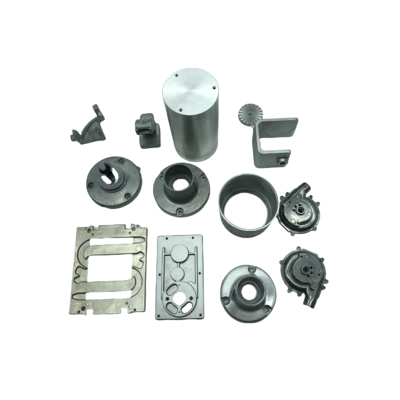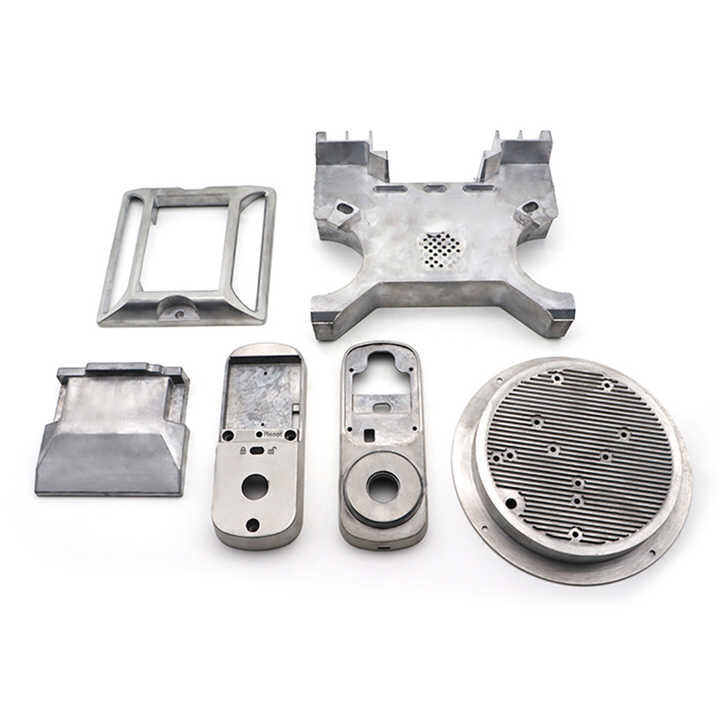Precision aluminum casting methods that optimize production efficiency
Wiki Article
The Future of Light Weight Aluminum Foundries: Innovations and trends Shaping the Industry
The light weight aluminum shop industry is undergoing considerable change. Trick fads highlight the importance of sustainability and performance. Developments in wise production and automation are becoming common. Shops are progressively concentrated on utilizing recycled products. This shift questions regarding future methods and innovations. How will these adjustments influence production methods and market dynamics? The answers might redefine the industry landscape in unexpected methods.Advancements in Smart Manufacturing Technologies
As the aluminum factory industry progresses, advancements in clever manufacturing technologies are becoming progressively necessary for boosting performance and performance. The combination of automation, fabricated knowledge, and the Web of Points (IoT) is transforming typical shop operations. These modern technologies enable real-time tracking of procedures, enabling instant adjustments that enhance output and decrease waste.Moreover, artificial intelligence algorithms assess manufacturing data to determine patterns and predict maintenance requirements, decreasing downtime. Robotics are increasingly used for recurring tasks, freeing competent employees to concentrate on more intricate obstacles. In addition, electronic twins-- virtual versions of physical procedures-- assist in simulations that can enhance design and functional approaches.
The adoption of these wise production modern technologies is driving affordable advantages in the light weight aluminum factory market. By streamlining process and boosting decision-making abilities, factories can meet growing market needs while keeping high-quality requirements. The future of aluminum factories is without a doubt linked to these technical advancements.
Embracing Eco-Friendly Products and Processes
The light weight aluminum foundry market is significantly concentrating on green products and processes to boost sustainability. This change consists of the adoption of sustainable material sourcing, energy-efficient manufacturing strategies, and efficient recycling and waste monitoring methods. By integrating these techniques, shops aim to lower their environmental influence while keeping competitiveness on the market.Lasting Material Sourcing
Just how can aluminum foundries boost their sustainability efforts? Lasting product sourcing has actually emerged as a vital strategy in achieving this objective. By prioritizing recycled light weight aluminum, factories can greatly decrease their ecological impact, as recycled products require less power and fewer resources contrasted to main light weight aluminum production. Additionally, sourcing products from certified suppliers that abide by environment-friendly techniques promotes liable mining and minimizes environmental effect. Shops are additionally discovering alternative materials, such as biopolymers and environment-friendly finishings, to enhance conventional aluminum processes. Teaming up with stakeholders, including suppliers and environmental companies, fosters technology in sourcing strategies. Eventually, embracing lasting material sourcing not just lines up with global sustainability goals however likewise placements light weight aluminum foundries as leaders in environmentally liable production.Energy-Efficient Production Techniques
Light weight aluminum factories are increasingly taking on energy-efficient manufacturing strategies to match their lasting material sourcing efforts. These approaches concentrate on reducing energy usage throughout the manufacturing procedure. Advanced technologies, such as induction melting and optimized casting processes, are being applied to reduce the total carbon impact. Furthermore, automation and smart production systems improve operational efficiency, permitting far better energy administration. Foundries are likewise checking out the combination of renewable resource resources, such as solar and wind, to power their procedures. By focusing on energy performance, light weight aluminum shops not only reduced production costs but likewise align themselves with international sustainability goals, making certain an extra ecologically responsible technique to light weight aluminum manufacturing while fulfilling the increasing demand for green practices in the industry.Recycling and Waste Monitoring
Embracing environment-friendly products and processes, aluminum factories are focusing on recycling and waste administration strategies to improve sustainability in their procedures. By integrating closed-loop systems, these facilities are decreasing waste and making best use of resource effectiveness. Scrap aluminum, an easily offered material, is being reused on-site, greatly decreasing the requirement for virgin products and lowering energy consumption. Innovations in sorting and processing technologies even more facilitate the recycling of aluminum, guaranteeing that even infected products can be repurposed successfully. In addition, shops are adopting sustainable practices such as minimizing contaminated materials and promoting using eco-friendly products for packaging. This commitment to reusing not just lowers ecological impact however also enhances the financial viability of aluminum factories in an open market.The Function of Automation and Robotics
Automation and robotics are increasingly changing the aluminum factory market, considerably enhancing production efficiency. By incorporating advanced innovations, shops can lower labor costs while simultaneously improving safety and security requirements for their workforce. This shift not only improves operations yet additionally positions the sector for sustainable growth in an open market.Enhanced Manufacturing Effectiveness
Changing manufacturing processes, the assimilation of advanced robotics and automation modern technologies has actually ended up being a keystone for light weight aluminum factories looking for enhanced performance. These advancements streamline process, minimize cycle times, and improve product top quality by reducing human mistake. Automated systems can keep an eye on assembly line in real-time, enabling prompt modifications that enhance output. In addition, robotics assist in the handling of dangerous materials, guaranteeing much safer workplace while raising throughput. Anticipating upkeep modern technologies also add to performance by anticipating equipment failures, thus lowering downtime. Because of this, light weight aluminum foundries can achieve greater uniformity in their items while reacting more quickly to market needs. This welcome of automation is establishing a new criterion for performance and functional excellence within the market.
Minimizing Labor Expenses
The shift towards advanced robotics and automation in light weight aluminum factories not just improves manufacturing effectiveness however also plays a significant function in lowering labor prices. By integrating automated systems, factories can reduce the reliance on manual labor, which commonly includes high wages and training expenses. Robotics enhance recurring tasks such as pouring, molding, and finishing, permitting a greater output with less workers. This technical modification not only reduces labor-related expenses but likewise improves consistency and quality in production. Moreover, automation can operate around the clock, optimizing functional hours without the linked expenses of overtime or shift differentials. Because of this, aluminum shops can accomplish significant savings while maintaining competitive pricing in a developing market landscape.Improving Safety Requirements
While typical light weight aluminum shop operations often subject workers to hazardous environments, the assimilation of robotics and automation considerably enhances Continue security standards within the market. Automated systems can carry out risky jobs, such as liquified metal handling and hefty lifting, minimizing human exposure to hazardous conditions. Furthermore, robotics can run in severe temperatures and poisonous ambiences, efficiently decreasing the risk of injury. Advanced keeping an eye on innovations and synthetic intelligence warranty real-time safety assessments, permitting prompt actions to possible risks. Furthermore, automation streamlines workflows, reducing the chance of crashes brought on by human error. Consequently, the adoption of these modern technologies not just enhances safety but likewise cultivates a much more effective and efficient working environment in light weight aluminum foundries.Enhancing Power Effectiveness in Manufacturing
As light weight aluminum factories look for to preserve competition in a developing market, improving energy effectiveness in manufacturing has emerged as a critical focus. By embracing sophisticated innovations such as high-efficiency melting furnaces and automated temperature level controls, foundries can especially decrease energy intake. Carrying out real-time monitoring systems permits specific tracking of power usage throughout the production process, allowing quick changes to optimize efficiency.In addition, shifting to alternate energy resources, including renewable options, can better reduce the carbon footprint. The combination of energy recuperation systems, which recover waste warm for reuse, is coming to be increasingly typical. Educating employees in power administration techniques guarantees that everybody involved in the manufacturing procedure bears in mind energy usage.
These efforts not just lower operational costs but likewise straighten with international sustainability objectives, positioning light weight aluminum shops as liable players in the industry while boosting their general competition. - Aluminum Foundry
Developments in Recycling Aluminum
Developments in reusing light weight aluminum have gained momentum together with efforts to boost energy performance in production. The light weight aluminum industry has actually accepted advanced innovations that enhance the reusing process, decreasing energy intake and ecological impact. Strategies such as hydrometallurgy and new sorting modern technologies boost the extraction of light weight aluminum from scrap, boosting return rates and ensuring better recycled material.
In addition, the development of closed-loop recycling systems allows factories to recycle aluminum without considerable destruction in high quality, making the procedure extra lasting. Innovations in logistics and collection, consisting of enhanced radar and automated sorting, have actually additionally played a crucial duty in increasing the performance of light weight aluminum healing. These advancements not just add to a round economic climate but also assist alleviate the carbon impact related to light weight aluminum manufacturing. As the need for lasting techniques expands, these innovations place the aluminum factory market as a leader in responsible source management.
Reacting to Market Needs and Consumer Trends
Flexibility has actually become a foundation for aluminum foundries replying to progressing market demands and consumer trends. As markets increasingly focus on sustainability, light weight aluminum foundries are shifting towards eco-friendly techniques, including improved recycling procedures and decreased carbon footprints. This shift lines up with customer preferences for ecologically liable products, driving shops to introduce their offerings.Additionally, the surge of lightweight products in auto and aerospace fields demands innovations in light weight aluminum alloys and casting techniques. Foundries are buying r & d to generate high-strength, lightweight components that meet strict efficiency criteria.
Modification has actually gained grip, with consumers seeking customized remedies. Light weight aluminum shops are leveraging innovative manufacturing technologies, such as 3D printing, to accommodate certain customer needs efficiently. This responsiveness not just satisfies consumer demands but also settings light weight aluminum shops competitively in a vibrant market landscape, ensuring their relevance in an ever-changing industrial environment.

Regularly Asked Questions
How Do Light Weight Aluminum Foundries Impact Citizen Economies?
Light weight aluminum shops substantially impact local economies by developing tasks, boosting need for regional vendors, and adding to neighborhood development. Their procedures special info commonly cause raised tax obligation revenues, which can money essential public solutions and framework improvements.What Are the Safety Regulations for Light Weight Aluminum Shop Workers?
Safety laws for aluminum shop employees include mandatory personal safety devices, correct air flow systems, regular training on unsafe products, and adherence to standards established by work-related health and wellness managements to minimize risks and warranty employee safety. - Aluminum FoundryExactly How Does Aluminum Recycling Affect Global Supply Chains?
Light weight aluminum recycling significantly lowers need for resources, improves source effectiveness, and stabilizes rates. This change influences worldwide supply chains by promoting a round economic situation, promoting sustainability, and making certain a much more durable sector in changing markets.What Occupation Opportunities Exist in the Aluminum Shop Industry?
Various career chances exist in the aluminum shop industry, including duties in engineering, quality assurance, manufacturing monitoring, and r & d. Knowledgeable labor positions such as mold and mildew makers and equipment operators are likewise popular.Exactly How Do International Profession Policies Impact Aluminum Foundries?
International profession policies considerably impact light weight aluminum shops by affecting import tolls, supply chain dynamics, and market accessibility. These aspects can influence functional prices, competitiveness, and overall earnings within the international light weight aluminum production landscape.By focusing on recycled aluminum, factories can greatly reduce their ecological footprint, as recycled products need much less energy and less resources compared to main light weight aluminum production. Aluminum foundries are progressively adopting energy-efficient production methods to match their sustainable material sourcing initiatives. Automation and robotics are significantly changing the light weight aluminum foundry sector, significantly enhancing production performance. The shift towards advanced robotics and automation in light weight aluminum factories not only improves manufacturing performance however likewise plays a substantial function in decreasing labor expenses. As aluminum shops look for to preserve competitiveness in an look at this web-site advancing market, improving energy effectiveness in production has actually arised as an essential emphasis.
Report this wiki page